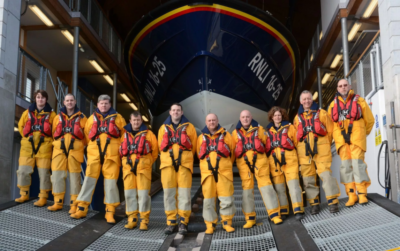Today marks the 200th anniversary of the founding of the RNLI, a result of Sir William Hillary’s vision for a service dedicated to saving lives at sea becoming a reality at a meeting at Bishopsgate’s London Tavern on 4 March 1824. Hillary lived on the Isle of Man and witnessed the wrecking of dozens of ships and many drownings from his home. The charity was founded, with royal patronage, as the National Institution for the Preservation of Life from Shipwrecks after his appeal. The name was changed to the Royal National Lifeboat Institution in 1854.
The RNLI is the charity that saves lives at sea, driven by values of selflessness, courage, dependability, and trustworthiness. There are 238 lifeboat stations in the UK. Since the charity launched its first lifeboat, the RNLI has saved more than 144,000 lives. The vast majority of RNLI people are volunteers – ordinary people doing extraordinary things. They are supported entirely by public donations, there is no Government funding.
There have been a number of remarkable events over the 200 years, some positive, others less so. Most of you probably won’t be aware of the Whitby lifeboat disaster of 1861 where twelve crew lost their lives, or The Suevic rescue in 1907 which set the record for the largest number of people saved – 456 in a single operation in RNLI history, a record that still stands today.
A defining moment for the organisation was on 10 December 1886, where 27 lifeboatmen lost their lives from the Southport and St Annes lifeboats whilst attempting to rescue the crew from the German barque Mexico. After the Mexico disaster, Sir Charles Macara and his wife Marion organised an event in Manchester that changed the face of fundraising forever. On the first Lifeboat Saturday on 10 October 1891, bands, floats, and lifeboats paraded through the streets of Manchester, followed by volunteers with buckets and purses on poles raising funds.
My favourite lifeboat station is at Moelfre on the east coast of Anglesey. I love the annual open days, when you can wander around the station, meet the volunteers, read the accounts in the log of rescues, and pause to reflect on the bravery, heroics and humanity from the old photos and press cuttings on the boathouse walls. Former coxswain Richard ‘Dic’ Evans was decorated twice with the RNLI Medal for Gallantry. I always leave inspired and humbled.
There is something both uplifting and concerning about seeing a lifeboat crew arrive at the station and launch for what they call out on a shout. As a young boy it’s the spectacle, as an adult its appreciation of the bravery as to the uncertainty waiting for them and what the result of their actions will be. Here’s a team where the results are genuinely a matter of life and death.
High-functioning teams are what make high-performing startups and organisations like the RNLI effective. They achieve superior levels of participation, cooperation, and collaboration because their members trust one another, share a strong sense of group identity, and have confidence in their effectiveness as a team. They have established norms that strengthen trust, group identity, and group efficacy. As a result, their members are emotionally engaged to collaborate in furthering the team’s work.
What I’ve seen from the extraordinary endeavours of RNLI teams are attributes that can be a yardstick for building a great startup team:
- Their working style has an unforgiving, frenetic rhythm and set of expectations.
- The team emanates a discernible energy and focus.
- They are utterly unique in the ambitions of their goals, the intensity of their conversations, and their focus on results.
- Intense and intimate, they work best when forced to work under strict time constraints but retain a focus on the welfare of colleagues.
- Team members put a great premium on collaboration.
- They focus on thinking correctly under pressure.
- Each team member has a personal credo of it’s down to me to make a difference.
Every startup is fuelled by the energy and talent of the team, the individuals and collective sum-of-the-parts are vital ingredients to startup success. I’ve always taken to heart the advice of Ben Horowitz, author of The Hard Thing About Hard Things, who said: We knew that if we took care of the people, the products, and the profits – in that order – we had a chance of success.
Startup teams must move quickly through the forming-storming-norming-performing stages of team development identified by Tuckman, so alignment on vision and values, and having good social skills are vital. If these two attributes don’t exist, team members can begin to feel like rats in a maze, and not see where they’re going, and quickly the team breaks down. While some chaos can be good for innovation, you want to avoid wasted energy and people not utilising their talents fully.
Reflecting on my time observing and talking with RNLI crews, here are my ten thoughts about the attributes I’ve seen from their teams to take into your startup thinking.
1. Adaptability Being flexible is a key trait of any team player, RNLI, or startup, confronting and resolving crises, meeting deadlines, or working to face unexpected challenges. Every out on a shout is different and needs everyone on the team to be calm but also able to change gears and refocus as a situation unfolds, odds are more issues will arise to further impact the rescue.
2. Mutual respect is a key element in relationship development and growth in a team and is the catalyst for building an outstanding team. Inevitably, the team dynamics evolve, and voices will align as collaboration becomes the norm. A team that has respect for each other will be more effective as they ultimately trust each other.
3. Specialisation An RNLI team shows effective teamwork and outcomes are achieved by members coalescing in their defined roles and talents to achieve an end goal. Building a team that is fit for purpose, combining skills, experience and personality is vital in a startup, have specialists that do their own thing but also coming together as a single unit is vital.
4. Be open and honest with everyone On the way to a rescue, the coxain briefs the crew about the rescue situation ahead. There is no sugar coating, authenticity in the face of what is clearly ‘bad news’ is what builds focus. Likewise in a startup, it’s important to be candid with everyone. Be clear what the challenges are but also show the way forward – we have a solution to make it through the turbulence.
5. Think it through but do it quickly By definition, every RNLI rescue is reactive. They train for situations, but when their pagers go and the crew dash to the station, they have to think on their feet and make plans fast. Likewise in your startup, don’t get bogged down by emotion and stall. Folk in a startup need to have a sense of purpose and direction but they do need to know what is expected of them in the moment.
6. Build consensus Many startup leaders fall into the trap of thinking they always have a solution in-hand. But if you come up with a plan by yourself and simply tell everyone else what it is, you’ll have less committed buy in.
What I’ve seen on every RNLI out on a shout is they work as a team from the outset, co-creating the rescue plan. They also have retrospectives, input on how the situation unfolded and how the outcome provides an opportunity to do things better. As your team feels more collective ownership, they’ll learn and be confident in overcoming the next challenge.
7. Discover your team’s hidden strengths A team may already have the resources it needs to be successful, but what talents have been hidden or lying dormant? What skills have never been shared or developed? This is where a leader needs to provide opportunity for personal development and growth to unlock ambition and potential. Don’t silo your folks in a neat box of today’s role.
8. No finger pointing When a mistake is made, it’s easy to find a scapegoat and lay individual blame. This will only lead to distrust and low morale. The entire team should accept responsibility for errors or poor outcomes and move forward together ensuring it doesn’t reoccur. Working with others sometimes requires patience and tolerance. We all strive for it, but few people are truly unflappable. Patience will keep a team motivated and allay conflict.
9. Passion Everyone I’ve ever met at the RNLI is passionate about their work. This underpins a cohesive team, and provides for clear, open communication. When team members are able to openly and freely communicate with one another, it allows for the free flow of ideas and information. Open communication fosters an environment of trust, transparency, and respect, which are essential ingredients for a successful team. Nothing will beat a passionate team, united by vision and purpose.
10. Collaboration creates self-managed teams A team doesn’t need a superstar leader to excel, but they do need a self-assured, trustworthy, ambitious leader that keeps morale high and knows when to rally and stand up and be counted, and equally when to stand aside and let the team lead themselves,
In the early days of a startup, the team is small and nimble, collaborating to get the business off the ground. As the startup grows, the most effective startups maintain this culture. It is clear that collaboration leads to better results, encourages open communication, builds stronger relationships, promotes learning, and increases engagement. Building a self-managed team is a key goal for a startup founder.
Summary
Voltaire said Life is a shipwreck, but we must not forget to sing in the lifeboats, very apt for today’s 200th anniversary, the crew belting out sea shanties on the return from a successful out on a shout.
Check out this podcast with some moving stories: https://rnli.org/about-us/our-history/2024/200-voices
Talent makes capital dance is a phrase I always ask founders to consider when thinking about their startup. What are the other ingredients for a founder to consider when shaping their startup team? Henry Ford once said, Why is it that every time I ask for a pair of hands, they come with a mind attached? In a startup, minds dramatically amplify the value of hands and they become even more powerful when they’re able to engage with likeminded, stimulated other folk in the team.
A key objective as a startup founder on your growth journey is to build an outstanding team of individuals, not a team of outstanding individuals. The RNLI shows how to do this, so get along to your nearest lifeboat station, make a donation and watch true team spirit and collaboration in action.


